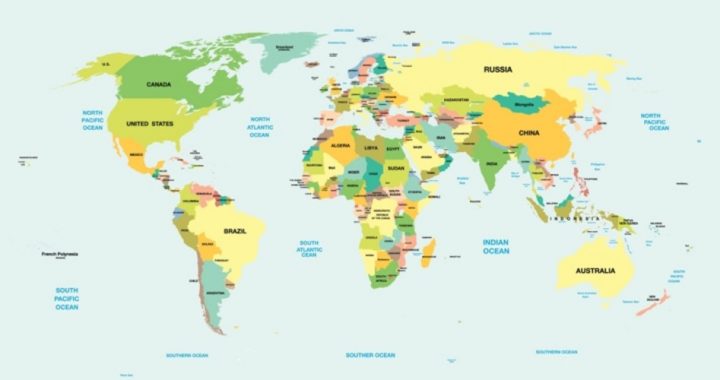
With all the storm and stress over President Trump’s temporary ban on citizens of several countries wishing to enter the United States, we may well wonder whether a country professing to be a land of the free has any moral justification for enforcing border controls. It is sometimes argued that international borders are artificial and unjustifiable limitations on one of the most fundamental of human rights, the right to freedom of movement. But are they?
Just as a perfect world populated by angelic beings would have no need of earthly government, as James Madison once observed, so too would such a perfect world have no need of international barriers. Were we all without sin, there would be no moral basis for preventing the absolute freedom of movement, such that people could choose to live in whatever climate or environment suited them, whether mountain or prairie, seacoast or tundra, city or village.
But the world we now live in does not remotely resemble such a paradise. Just as the task of the American Founders was to find the best type of government that humans in their fallible, fallen state could sustain, so the ever-changing boundaries and rules for international travel and commerce — not to mention immigration and naturalization — reflect an ongoing effort to adapt the worldwide system of sovereign nations to best suit the cultural and political realities of the human race.
When the United States of America was founded, it took shape not just as a collection of laws, magistracies, and jurisdictions. It also had, and still has — like every other country in the world — a distinct culture that underpins our entire political and legal system. In other words, the laws that we have protecting rights such as freedom of religion and of speech and the right to bear arms are in the first instance the product of a culture whose roots draw their sustenance from thousands of years of Judeo-Christian and classical culture. For instance, while there are many differences between our culture and that of ancient Rome, we share Roman assumptions about the need for order, about the paramountcy of the law, about military virtue, and so forth. While the world of Moses and the early Israelites in the desert seems mostly alien to us, the commandments that they received from their God are not. From more recent Christian culture, we derive our assumptions about the primacy of free will and individual liberty; for Americans, the notion of all-superintending Fate, so popular among ancient Greco-Romans and modern Asians alike, is inimical to liberty, which requires both individual choice and responsibility.
There remain, of course, many other cultures besides our own. Some of them are older than Western culture — much older. Chinese and Indian cultures probably stretch back, in something resembling recognizable form, to several thousand years before the “West” was even thought of. Others, such as Islamic culture in the Middle East, are younger. But many of these cultures have powerful elements, not easily set aside by those who espouse them, that are in direct contradiction to core Western values.
For example, in Islamic culture, abandonment of the religion of the faithful is unthinkable, and punishable by death. This means that large numbers of Muslims are particularly opaque to the influence of foreign culture — and, more often than not, to benefits, such as equality of the sexes and individual liberty — offered by Western society.
Nor are such cultural clashes a novel issue. Alexander Hamilton, routinely invoked as the Founding Father whose vision most accurately aligned with what America has in fact become, is seldom consulted nowadays on the matter of immigration. Yet Hamilton, writing some years after independence, in 1802, was no fan of unrestricted immigration — an opinion decidedly out of step with modern multiculturalism. In a time when constitutional limits on government power were still for the most part scrupulously observed, Hamilton understood clearly the potential for alien cultures to change our own commitment to republican principles:
The safety of a republic depends essentially on the energy of a common National sentiment; on a uniformity of principles and habits; on the exemption of the citizens from foreign bias, and prejudice; and on that love of country which will almost invariably be found to be closely connected with birth, education and family…. Foreigners will generally be apt to bring with them attachments to the persons they have left behind; to the country of their nativity, and to its particular customs and manners. They will also entertain opinions on government congenial with those under which they have lived, or if they should be led hither from a preference to ours, how extremely unlikely is it that they will bring with them that temperate love of liberty, so essential to real republicanism? There may as to particular individuals, and at particular times, be occasional exceptions to these remarks, yet such is the general rule…. By what has been said, it is not meant to contend for a total prohibition of the right of citizenship to strangers…. But there is a wide difference between closing the door altogether and throwing it entirely open…. Some reasonable term ought to be allowed to enable aliens to get rid of foreign and acquire American attachments; to learn the principles and imbibe the spirit of our government; and to admit of at least a probability of their feeling a real interest in our affairs. A residence of at least five years ought to be required…. To admit foreigners indiscriminately to the rights of citizens, the moment they put foot in our country … would be nothing less, than to admit the Grecian Horse into the Citadel of our Liberty and Sovereignty.
In sum, all countries have the right to control their borders, not only to restrain criminal activity, but also to safeguard their culture — especially if that culture upholds liberty and limited government.



